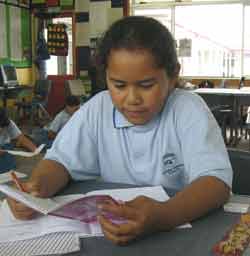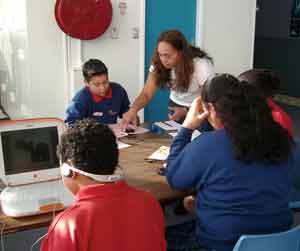 |
Students’ attitudes, interests and liking for a subject have a strong bearing on their achievement. The writing survey sought information from students about their curriculum preferences and perceptions of their achievement, using the same questions for both year 4 and year 8 students. It was administered to the students in a session that included both team and independent tasks (four students working together or individually on tasks, supported by a teacher). When it was introduced, all students were invited to ask for help with reading or writing.
The survey included five items which asked students to select options from a list, two items which invited students to write comments and fifteen items which asked students to record a rating response by circling their choice.
|
Students were asked what writing activities they liked most at school, choosing up to three responses from a list of six. The percentages of students choosing each option are summarised below, with comparative figures from 2002 in parentheses and 1998 in brackets.
Writing stories was clearly the most popular writing activity at school, in 2006, as in 2002 and 1998, at both year levels. Writing poetry has also retained quite high popularity at both year levels, along with writing letters for year 4 students. Writing in other school subjects became more popular between 1998 and 2002 at both year levels, but especially year 8, and that increase has been maintained in 2006.
Preferred
writing at school |
%
responses
2006
(02) [98] |
| y4 |
y8 |
|
writing
stories |
73 (60) [72] |
70 (60) [70] |
writing poems |
50 (52) [49] |
45 (42) [46] |
writing
letters |
50 (46) [51] |
32 (31) [41] |
keeping
a diary |
33 (33) [42] |
20 (25) [25] |
writing
in science, social studies and other subjects |
32 (33) [27] |
39 (40) [29] |
other (write what it is) |
12 (16) [14] |
19 (16) [14] |
Students were then asked what writing activities they liked to do in their own time, choosing their favourite activity from a list of eight options. The addition of two new options (text messages and emails) for the 2006 survey has resulted in dramatically changed preferences for year 8 students, almost half of whom indicated that writing text messages was their favourite writing activity in their own time. The effect was less dramatic for year 4 students, even though writing text messages was their second most popular writing activity in their own time. Writing letters, poems and diary entries were nominated as preferred activities by no more than five percent of year 8 students.
Preferred
writing in own time |
%
responses
2006
(02) [98] |
| y4 |
y8 |
writing stories |
33 (33) [36] |
19 (27) [37] |
writing text messages |
16 (-) [-] |
49 (-) [-] |
writing letters |
12 (16) [12] |
4 (14) [14] |
writing poems |
10 (14) [16] |
5 (15) [16] |
writing in a diary |
9 (14) [15] |
4 (17) [12] |
writing emails |
8 (-) [-] |
11 (-) [-] |
writing about hobbies or sports |
8 (10) [10] |
5 (15) [8] |
writing about science, social studies and other subjects |
2 (3) [5] |
2 (3) [3] |
Asked what “people need to do to be good writers”, students could choose up to three things from a list of 10. There has been quite a high level of stability between 1998 and 2006. Compared to year 4 students, year 8 students placed more emphasis on liking writing and using their imagination and less emphasis on writing neatly.
|
Things needed by good writers |
%
responses
2006
(02) [98]
|
| y4 |
y8 |
use their imagination |
57 (51) [56] |
79 (66) [68] |
be willing to try things out |
36 (40) [36] |
32 (29) [27] |
go back and check their work |
33 (24) [25] |
31 (20) [20] |
learn how to use punctuation |
29 (26) [33] |
39 (31) [35] |
know how to spell words |
25 (20) [23] |
19 (15) [12] |
write neatly |
25 (24) [25] |
11 (8) [10] |
read a lot |
23 (19) [22] |
16 (12) [13] |
talk about their work with others |
19 (15) [13] |
6 (8) [8] |
like writing |
16 (19) [17] |
41 (35) [38] |
write lots |
13 (14) [21] |
13 (12) [15] |
Students were asked to write down what they needed to do to “get better in writing”. For each student, up to three distinct responses were coded and tallied under eight headings. There
have been only modest changes between 1998 and 2006, and differences between the strategies of year 4 and year 8 students have remained quite small.
| Need
to do to get better |
%
responses
2006
(02) [98]
|
| y4 |
y8 |
spelling |
26 (17) [24] |
22 (27) [27] |
neatness |
25 (29) [17] |
17 (21) [17] |
punctuation |
16 (12) [11] |
20 (20) [21] |
increase ideas/resources |
16 (18) [16] |
28 (20) [20] |
write more often |
14 (14) [19] |
14 (15) [18] |
editing/checking |
7 (9) [6] |
8 (7) [6] |
understanding mechanics/grammar |
5 (8) [2] |
11 (8) [4] |
enjoyment |
3 (2) [0] |
4 (3) [1] |
In a more narrowly focused question, students were asked to indicate what they usually did when they couldn’t
spell a word they needed for writing. They could choose up to two things from a list of eight. The most popular strategy was to use a dictionary. Between 1998 and 2006, and at both year levels, the option of asking the teacher has declined noticeably in popularity, while guessing the spelling or making an attempt and then
checking the correct spelling later have become more popular.
| Spelling
strategy |
%
responses
2006
(02) [98]
|
| y4 |
y8 |
use a dictionary |
56 (56) [62] |
55 (54) [60] |
try, then check out later |
29 (14) [16] |
27 (15) [17] |
sound out the word |
28 (33) [33] |
21 (22) [18] |
guess |
26 (12) [15] |
21 (16) [16] |
ask the teacher |
17 (25) [34] |
14 (18) [30] |
ask a friend |
12 (16) [19] |
30 (23) [27] |
use another word |
5 (6) [4] |
7 (9) [9] |
use computer spell checker |
3 (2) [-] |
7 (5) [-] |
In the last question of this type, students were asked what they wrote on a computer. They could choose as many options as they liked from a list of seven. The percentages of students choosing each option in 2006 and
2002 are shown below (this question was not asked in 1998). Stories and emails were most popular, with stories more prominent at year 4 level and emails much more prominent among year 8 students. Writing letters or poems became markedly less
common for year 8 students between 2002 and 2006.
|
Writing activity on computer |
%
responses |
2006
(02) |
| y4 |
y8 |
stories |
59 (59) |
45 (46) |
emails |
44 (48) |
72 (69) |
letters |
36 (41) |
31 (43) |
poems |
30 (32) |
16 (25) |
a diary |
17 (16) |
8 (10) |
writing about hobbies or sports |
16 (16) |
17 (18) |
writing in science, social studies and other subjects |
12 (11) |
19 (21) |
| Responses to the 15 rating items are presented below in separate tables for year 4 and year 8 students. There have been no large changes between 1998 and 2006, at either year level. The most interesting change for year 4 students is an increase in reported enjoyment of writing in their own time (question 5). For year 8 students, there have been modest declines in enjoyment of writing at school and in the percentage of students who report that their teacher reads their writing frequently. At both year levels, there has been little change in the reported use of computers for writing at school or at home – about 30 percent of year 4 students and 40 percent of year 8 students said that they used a computer for writing at school “heaps” or “quite a lot”. The corresponding percentages for writing on a computer at home were 50 and 60 percent. |
|
Compared to year 4 students, fewer year 8 students were highly positive about doing writing at school, about how good they believed themselves to be at writing, and about how they felt their teachers and parents viewed their writing abilities. Year 8 students also reported fewer opportunities in school to write “things like stories, poems or letters” and lower enthusiasm for writing in their own time. These differences may, at least in part, reflect the
well-known tendency of students to get more jaded about schoolwork as they get older. Such patterns have been found repeatedly in our other national monitoring surveys. Another influential factor may be that the emphasis on various types of writing tasks shifts between year 4 and year 8, with more creative opportunities at year 4 and substantial volumes of more formal writing required by year 8.
|

